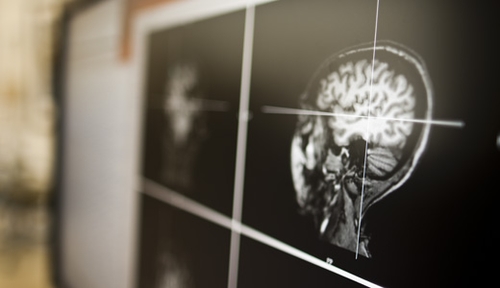UNMC physicians, allied health practitioners and scientists have formed the Nebraska Neuroscience Alliance in an effort to better serve people with developmental and degenerative diseases of the nervous system.
The NNA unites three of UNMC’s top neuroscience programs — the departments of neurological sciences and pharmacology and experimental neuroscience as well as the Munroe-Meyer Institute — to:
- Facilitate cooperative research activities;
- Enhance recruitment and retention of UNMC physicians and scientists; and
- Develop novel, state-of-the-art patient diagnostics and therapeutics.
The video above features patients with various diseases of the nervous system who stand to benefit from the work of the Nebraska Neuroscience Alliance. |
- Alzheimer’s and Parkinson’s disease;
- Autism;
- Epilepsy;
- Multiple sclerosis;
- Cancer;
- Microbial infections;
- Stroke; and
- Genetic disease.
“This alliance will bring together experts in research and clinical care with the shared goal of moving breakthroughs made in the laboratory to the patient bedside,” said Bradley Britigan, M.D., dean of the UNMC College of Medicine. “There’s no reason anybody with a neurological disorder should ever have to leave the state for their medical care.”
The architects of the NNA are:
- Howard Gendelman, M.D., chairman of the department of pharmacology and experimental neuroscience;
- Daniel Murman, M.D., interim chairman of the department of neurological sciences; and
- J. Michael Leibowitz, Ph.D., director of the Munroe-Meyer Institute.
Dr. Leibowitz said some of the directives that are encompassed in the NNA include:
- Personalized medicine — developing specific treatments tailored to individuals;
- Immunization-based nerve cell repair;
- Tissue and cell specific drug delivery;
- Nanomedicine;
- Brain regeneration; and
- Biomarker discovery and diagnostics.
With the population aging, the number of people incurring neurological problems is expected to increase dramatically, Dr. Murman said. The new alliance will look to improve life for all these people, Dr. Gendelman said.
“The diseases are different, but the journey is the same,” Dr. Gendelman said. “Translational research will heighten the impact of our discoveries and move them into human use much faster. It also will create more awareness in the community and allow us to more effectively raise funds to better meet the growing and changing needs of our medical center and our patients.”
